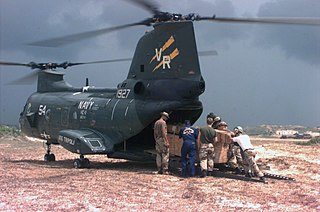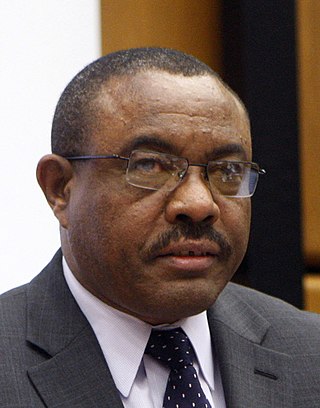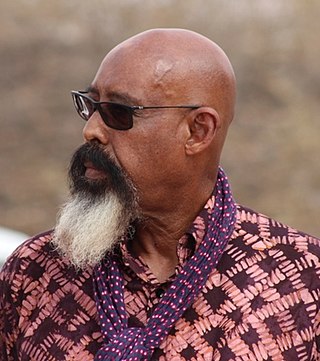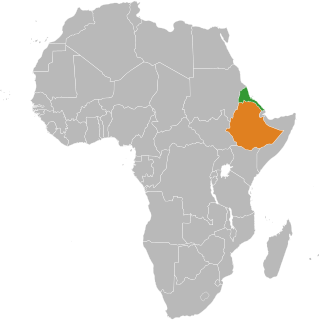External resources
- The General Agreement signed in Addis Ababa on 8 January 1993
- Addis Ababa Agreement concluded at the first session of the Conference on National Reconciliation in Somalia, 27 March 1993
The Conference on National Reconciliation in Somalia was an attempt to end the Somali Civil War. It led to the signing of the Addis Ababa Agreement (1993) , on March 27, 1993. Fifteen different warring factions agreed to the principles of reconciliation and disarmament, but the agreement was shoaled by continued violence in Somalia. It was preceded by the Informal Preparatory Meeting on National Reconciliation.
| Organization | Representative Chairmen |
|---|---|
| Somali Africans Muki Organization (SAMO) | Mohamed Ramadan Arbow |
| Somali Democratic Alliance (SDA) | Mohamed Farah Abdullahi |
| Somali National Alliance (SNA/USC) | General Mohamed Farah Aidid |
| Somali Democratic Movement/SNA (SDM/SNA) | Col. Mohamed Nur Aliyou |
| Somali Democratic Movement (SDM) | Abdi Muse Mayow |
| Somali National Democratic Union (SNDU) | Ali Ismael Abdi |
| Somali National Front (SNF) | General Omar Hagi Mohamed Hersi |
| Somali National Union (SNU) | Dr. Mohamed Ragis Mohamed |
| Somali Patriotic Movement (SPM) | General Aden Abdullahi Nur |
| Somali Patriotic Movement/SNA (SPM/SNA) | Ahmed Hashi Mahmoud (Vice Chairman) |
| Somali Salvation Democratic Front (SSDF) | General Mohamed Abshir Musse |
| Southern Somali National Movement/SNA (SSNM/SNA) | Col. Abdi Warsame Isaaq |
| United Somali Congress (USC) | Mohamed Qanyare Afrah |
| United Somali Front (USF) | Abdurahman Dualeh Ali |
| United Somali Party (USP) | Mohamed Abdi Hashi |

The Unified Task Force (UNITAF) was a United States-led, United Nations-sanctioned multinational force which operated in Somalia from 5 December 1992 until 4 May 1993. A United States initiative, UNITAF was charged with carrying out United Nations Security Council Resolution 794 to create a protected environment for conducting humanitarian operations in the southern half of the country.

Hailemariam Desalegn Boshe is an Welayta-Ethiopian politician who served as prime minister of Ethiopia from 2012 to 2018. He also previously served as deputy prime minister and Minister of Foreign Affairs under Prime Minister Meles Zenawi from 2010 to 2012. After Meles' death in August 2012, Hailemariam succeeded him as prime minister, initially in an acting capacity. He was then elected as the chair of the EPRDF, the ruling party, on 15 September 2012. Hailemariam also served as the chairperson of the African Union from 2013 to 2014.

United Nations Security Council resolution 837, adopted unanimously on 6 June 1993, after reaffirming resolutions 733 (1992), 746 (1992), 751 (1992), 767 (1992), 775 (1992), 794 (1992) and 814 (1993), the Council condemned the attacks on the United Nations Operation in Somalia II in which 24 Pakistani troops were killed and 56 injured, including 1 Italian and 3 American soldiers.

Major General Mohammed Said Hersi Morgan, also known as General Morgan or Colonel Morgan, is a Somali military and faction leader. He was the son-in-law of Siad Barre and Minister of Defence of Somalia. He hails from the Majeerteen Darood clan.
A United Nations Economic Commission for Africa-sponsored meeting held in Addis Ababa, Ethiopia, January 4–8, 1993. Its purpose was to attempt to settle differences between the warring factions of the Somali Civil War. It led to a formal agreement at the Conference on National Reconciliation in Somalia, but factional fighting continued mostly unabated.
Many factions opposed to Siad Barre set aside tribal and political differences to unite in purpose to overthrow his regime. After the collapse of Siad Barre's government in 1991 the nation fell into a long period of increasingly chaotic conflict between forces of clans, militias, warlords, separatist, religious functions and rebellion movements, other nations, and even the United Nations peacekeepers.
Addis Ababa Agreement may refer to:
The Addis Ababa Agreement was a settlement reached at the 1993 Conference on National Reconciliation in Somalia.

United Nations Security Council resolution 814, adopted unanimously on 26 March 1993, after reaffirming resolutions 733 (1992), 746 (1992), 751 (1992), 767 (1992), 775 (1992) and 794 (1993) on the ongoing civil war in Somalia, the council, acting under Chapter VII of the United Nations Charter, authorised an extension of the United Nations Operation in Somalia II until 31 October 1993.

United Nations Security Council resolution 865, adopted unanimously on 22 September 1993, after reaffirming resolutions 733 (1992), 746 (1992), 751 (1992), 767 (1992), 775 (1992), 794 (1992), 814 (1993) and 837 (1993), the Council addressed the process of national reconciliation and political settlement in Somalia, during the civil war.

United Nations Security Council resolution 886, adopted unanimously on 18 November 1993, after reaffirming resolutions 733 (1992) and all of its subsequent resolutions on Somalia, the council discussed the situation in the country and renewed the mandate of the United Nations Operation in Somalia II until 31 May 1994.

United Nations Security Council resolution 897, adopted unanimously on 4 February 1994, after reaffirming resolutions 733 (1992) and 886 (1992) and all of its subsequent resolutions on Somalia, the Council discussed the role of the United Nations Operation in Somalia II in the peace process in the country.

Ethiopia–Italy relations are the current and historical relations between Ethiopia and Italy.

Italian Ethiopia, also known as the Italian Empire of Ethiopia, was the territory of the Ethiopian Empire which was occupied by Italy for approximately five years. Italian Ethiopia was not an administrative entity, but the formal name of the former territory of the Ethiopian Empire which now constituted the Governorates of Amhara, Harar, Galla-Sidamo, and Scioa after the establishment of Italian East Africa.

Sir Nicholas Peter Kay is a British diplomat. He has served as the British ambassador to Afghanistan, Sudan and the Democratic Republic of the Congo. From 2013 to 2016 he was the United Nations Special Representative for Somalia.

Ethiopia–Kenya relations are bilateral relations between Ethiopia and Kenya. The two nations maintain primarily trade ties.

Relations between Eritrea and Ethiopia are historically adversarial. Eritrea gained independence from Ethiopia in 1993 after the Eritrean War of Independence, after which relations were cordial. Since independence Eritrea's relationship with Ethiopia was entirely political, especially in the resuscitation and expansion of IGAD's scope. However, the 1998 Eritrean–Ethiopian War marked a turning point, and their relationship became increasingly hostile.
Filsan Abdullahi Ahmed, also called Filsan Abdi, is an Ethiopian activist and politician from the Somali Region. She is a founder of the Nabad project, a satellite television station for promoting communication and peace in Somali Region and between the Somali and Oromo communities.
The 1995 Ethiopian Federal Constitution formalizes an ethnic federalism law aimed at undermining long-standing ethnic imperial rule, reducing ethnic tensions, promoting regional autonomy, and upholding unqualified rights to self-determination and secession in a state with more than 80 different ethnic groups. But the constitution is divisive, both among Ethiopian nationalists who believe it undermines centralized authority and fuels interethnic conflict, and among ethnic federalists who fear that the development of its vague components could lead to authoritarian centralization or even the maintenance of minority ethnic hegemony. Parliamentary elections since 1995 have taken place every five years since enactment. All but one of these have resulted in government by members of the Ethiopian People's Revolutionary Democratic Front (EPRDF) political coalition, under three prime ministers. The EPRDF was under the effective control of the Tigray People's Liberation Front (TPLF), which represents a small ethnic minority. In 2019 the EPRDF, under Abiy, was dissolved and he inaugurated the pan-ethnic Prosperity Party which won the 2021 Ethiopian Election, returning him as prime minister. But both political entities were different kinds of responses to the ongoing tension between constitutional ethnic federalism and the Ethiopian state's authority. Over the same period, and all administrations, a range of major conflicts with ethnic roots have occurred or continued, and the press and availability of information have been controlled. There has also been dramatic economic growth and liberalization, which has itself been attributed to, and used to justify, authoritarian state policy.

Ethiopia–Germany relations are bilateral relations between Ethiopia and Germany. Traditionally, they have closest diplomatic relations characterized by friendly relations. The two countries established their embassies on 7 March 1905, and in 1907 by order of Emperor Menelik II, the German embassy moved in the current site in Addis Ababa. Both enjoyed favored relations and visited each other's countries on numerous occasions. Germany has an embassy in Addis Ababa and Ethiopia has an embassy in Berlin.